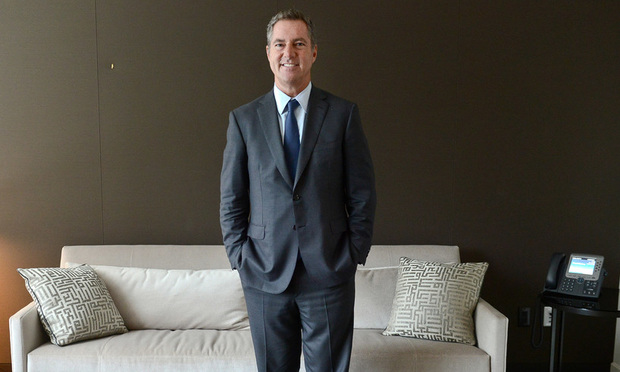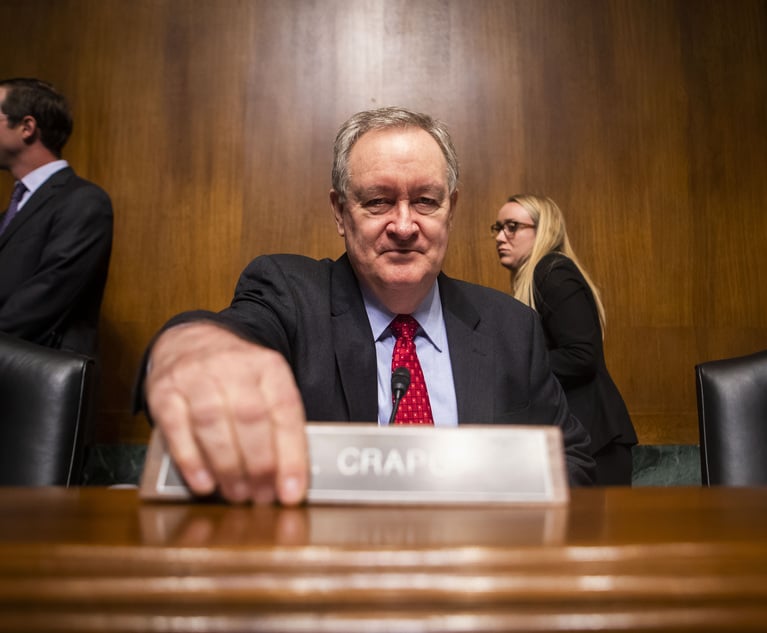Paul Weiss Mobilizes Army of Lawyers to Help Navigate Coronavirus Relief
Chairman Brad Karp wants "thousands" of lawyers across the U.S. to join what he expects will be an unprecedented effort.
March 16, 2020 at 03:37 PM
3 minute read
The original version of this story was published on The American Lawyer
 Brad Karp of Paul, Weiss, Rifkind, Wharton & Garrison; New York. Photo: David Handschuh
Brad Karp of Paul, Weiss, Rifkind, Wharton & Garrison; New York. Photo: David Handschuh
At the end of a destabilizing week that saw a torrent of event cancellations and business closures across the U.S., Paul, Weiss, Rifkind, Wharton & Garrison chairman Brad Karp found himself thinking about the millions of Americans that will soon be staring down the economic impacts of the growing coronavirus crisis.
While federal, state and local officials, along with the nonprofit sector, have pledged to make a number of resources available to help those in the need of either immediate or long-term assistance, the scope of the options and the steps needed to unlock them is bewildering.
Karp hit on the idea of enlisting the firm's attorneys to make sense of the programs for public assistance that are either in place or coming online.
"As these programs are rolling out, I believe we're going to be able to help these individuals access emergency resources that would otherwise be unavailable," he said.
On Saturday afternoon, he sent a firmwide email looking for volunteers to build a "swat team" to make sense of these resources. Within two hours, over 350 attorneys at the firm had responded by pledging their assistance. Another 25 to 50 have volunteered since the start of the day Monday.
"I've been chair of this firm for 13 years," Karp said. "There's nothing I've seen that compares to this."
The firm has organized its response into five different teams: federal programs, New York state programs, New York City programs, state programs outside of New York, and private and charitable organization programs. Another team will draft templates, FAQs and forms concerning each program.
After reviewing and summarizing the resources available in each of these categories, Paul Weiss lawyers will staff hotlines on a 24/7 basis to answer questions that emerge. Initial efforts will focus on the New York City region as well as Washington D.C.
Karp added that the firm is working with banks, professional sports leagues and teams and the firm's private equity clients—with dozens of portfolio companies—to get the word out to hourly workers.
He also hopes that the firm's effort will strike chord with others in the legal community, like when he and Lowenstein Sandler chairman and managing partner Gary Wingens succeeded in mobilizing 34 other law firm leaders to take action against the Trump administration's family separation policy.
While Karp is expecting his firm's lawyers to spend over 2,500 pro bono hours a day on the effort, that's not nearly enough.
"I think in the U.S. we're going to need thousands of lawyers to step up and work with us on this," he said.
NOT FOR REPRINT
© 2025 ALM Global, LLC, All Rights Reserved. Request academic re-use from www.copyright.com. All other uses, submit a request to [email protected]. For more information visit Asset & Logo Licensing.
You Might Like
View All

Goodwin Procter Relocates to Renewable-Powered Office in San Francisco’s Financial District

Greenberg Traurig Combines Digital Infrastructure and Real Estate Groups, Anticipating Uptick in Demand
4 minute read
Senator Plans to Reintroduce Bill to Split 9th Circuit
Law Firms Mentioned
Trending Stories
- 1The Rise and Risks of Merchant Cash Advance Debt Relief Companies
- 2Ill. Class Action Claims Cannabis Companies Sell Products with Excessive THC Content
- 3Suboxone MDL Mostly Survives Initial Preemption Challenge
- 4Paul Hastings Hires Music Industry Practice Chair From Willkie in Los Angeles
- 5Global Software Firm Trying to Jump-Start Growth Hands CLO Post to 3-Time Legal Chief
Who Got The Work
J. Brugh Lower of Gibbons has entered an appearance for industrial equipment supplier Devco Corporation in a pending trademark infringement lawsuit. The suit, accusing the defendant of selling knock-off Graco products, was filed Dec. 18 in New Jersey District Court by Rivkin Radler on behalf of Graco Inc. and Graco Minnesota. The case, assigned to U.S. District Judge Zahid N. Quraishi, is 3:24-cv-11294, Graco Inc. et al v. Devco Corporation.
Who Got The Work
Rebecca Maller-Stein and Kent A. Yalowitz of Arnold & Porter Kaye Scholer have entered their appearances for Hanaco Venture Capital and its executives, Lior Prosor and David Frankel, in a pending securities lawsuit. The action, filed on Dec. 24 in New York Southern District Court by Zell, Aron & Co. on behalf of Goldeneye Advisors, accuses the defendants of negligently and fraudulently managing the plaintiff's $1 million investment. The case, assigned to U.S. District Judge Vernon S. Broderick, is 1:24-cv-09918, Goldeneye Advisors, LLC v. Hanaco Venture Capital, Ltd. et al.
Who Got The Work
Attorneys from A&O Shearman has stepped in as defense counsel for Toronto-Dominion Bank and other defendants in a pending securities class action. The suit, filed Dec. 11 in New York Southern District Court by Bleichmar Fonti & Auld, accuses the defendants of concealing the bank's 'pervasive' deficiencies in regards to its compliance with the Bank Secrecy Act and the quality of its anti-money laundering controls. The case, assigned to U.S. District Judge Arun Subramanian, is 1:24-cv-09445, Gonzalez v. The Toronto-Dominion Bank et al.
Who Got The Work
Crown Castle International, a Pennsylvania company providing shared communications infrastructure, has turned to Luke D. Wolf of Gordon Rees Scully Mansukhani to fend off a pending breach-of-contract lawsuit. The court action, filed Nov. 25 in Michigan Eastern District Court by Hooper Hathaway PC on behalf of The Town Residences LLC, accuses Crown Castle of failing to transfer approximately $30,000 in utility payments from T-Mobile in breach of a roof-top lease and assignment agreement. The case, assigned to U.S. District Judge Susan K. Declercq, is 2:24-cv-13131, The Town Residences LLC v. T-Mobile US, Inc. et al.
Who Got The Work
Wilfred P. Coronato and Daniel M. Schwartz of McCarter & English have stepped in as defense counsel to Electrolux Home Products Inc. in a pending product liability lawsuit. The court action, filed Nov. 26 in New York Eastern District Court by Poulos Lopiccolo PC and Nagel Rice LLP on behalf of David Stern, alleges that the defendant's refrigerators’ drawers and shelving repeatedly break and fall apart within months after purchase. The case, assigned to U.S. District Judge Joan M. Azrack, is 2:24-cv-08204, Stern v. Electrolux Home Products, Inc.
Featured Firms
Law Offices of Gary Martin Hays & Associates, P.C.
(470) 294-1674
Law Offices of Mark E. Salomone
(857) 444-6468
Smith & Hassler
(713) 739-1250








